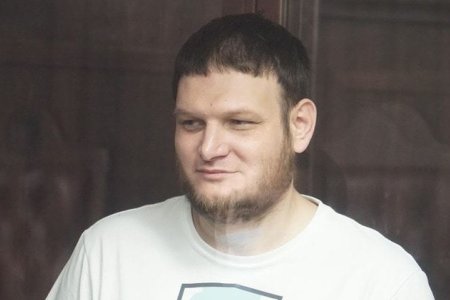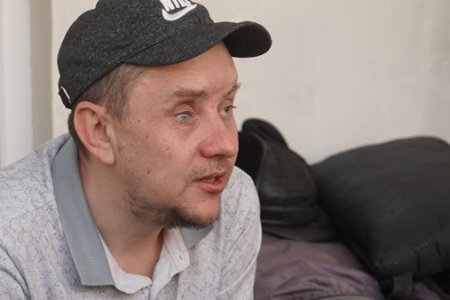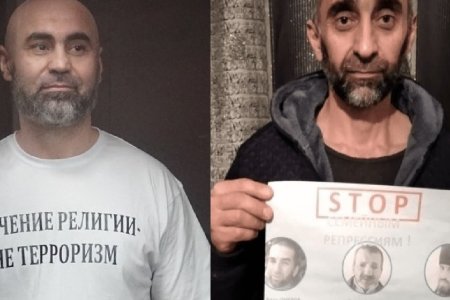
For five years after Russia’s invasion and annexation of Crimea, Remzi Bekirov helped ensure that the world learned about Russia’s mounting repression against Crimean Tatars and other Ukrainians. It was very likely the publicity which he helped provide around the Russians’ detention, in early March 2019, of Metropolitan Klyment, Head of the Orthodox Church of Ukraine in Crimea, which led to Klyment’s release.
Russia’s vengeance was savage, with Remzi Bekirov and 24 other Crimean Tatar journalists and activists arrested in March 2019 (or shortly afterwards) and later sentenced to huge terms of imprisonment. Remzi’s 19-year sentence was one of the worst to date, and significantly higher than the sentences passed by the Soviet regime against those who exposed the latter’s human rights violations.
The persecution and harassment did not end when the sentence came into force. Since November 2024, Bekirov has been held in ‘SUS’ [which translates as ‘harsh conditions of imprisonment’, although they are harsher than the already appalling conditions in which Bekirov and other Crimean Muslim political prisoners are held.
Initially Bekirov and other Muslims were able to find a place, away from the video cameras, to read the daily prayers which are a duty for any Muslim. Then, in December, the SUS part of the prison colony was moved to the first floor, and the prisoners began being thrown in punishment cells [SHIZO] merely for reading their daily prayers. The conditions in SHIZO are even worse, and such ‘punishment’ carries with it still greater restrictions, for example, on calls to ones family or how often a person can receive parcels (with food and other vital items).
Bekirov lodged a legal suit against the prison colony over his being placed in SHIZO merely for reading his obligatory daily prayers. It is near unheard of for Russian courts to decide in favour of Ukrainian political prisoners, and here was no exception. The court chose to consider that Bekirov had somehow infringed prison rules, after which a second video camera was installed in the SUS prison area, leaving no place at all for Muslims to worship without the CCTV.
According to Remzi’s wife, Khalide Bekirova, her husband was earlier placed in SHIZO for reading his daily prayers standing. Now he gets sent there for reading them while seated. They are in general stopping him from carrying out this form of daily worship.
Bekirov’s lawyer learned of the latest pressure upon Bekirov when he visited the prison colony on 24 April. He reports that Bekirov had only just come out of SHIZO, and that pretext after pretext has been used for placing him in such punishment cells ever since he was moved to Prison Colony No. 33 in Abakan. Given the will, the prison administration can always come up with one pretext or another and here it also uses claims that the night prayers, or praying on a mat, are, somehow, ‘infringements of regulations.’
At least two other Crimean Tatar political prisoners – Muslim Aliev and Teymor Abdullayev have also been thrown into punishment cells merely for reading the obligatory daily prayers. It is extremely likely that the prison head deliberately waited for the men to begin their prayers before entering their cell, in order to then accuse them of infringing the rules and to justify not moving them back to ‘normal’ harsh conditions, rather than SUS.
Remzi Bekirov (b. 20.02.1985) and Khalide have three children – two boys (Mukhammed, born in 2009) and Salakhuddin (b. 2012) and a small daughter, Safiye, born in June 2014.
Bekirov faced constant harassment and administrative prosecution for his civic position and journalist work for the vital Crimean Solidarity human rights movement. He understood that the FSB would next turn to politically motivated criminal charges, yet refused to be silenced.
His arrest and those of 24 other Crimean Tatar civic journalists and activists on or soon after 27 March 2019 aroused international condemnation with it widely understood that Russia was openly seeking to crush the Crimean Tatar human rights movement. Human Rights Watch stated that attempts to portray politically active Crimean Tatars as terrorists were aimed at silencing them, while Freedom House and Civil Rights Defenders said that the arrests were aimed at terrorizing Crimean Tatars, and had nothing to do with fighting terrorism. The US State Department, in turn, demanded the men’s release and that Russia stop “its unjust arrests; detentions; searches and persecution of Crimean Tatar activists and journalists.” All of the men arrested were recognized by the authoritative Memorial Human Rights Centre as political prisoners, and their release has been repeatedly demanded by UN and other international bodies.
The men were accused solely of ‘involvement’ in Hizb ut-Tahrir, on the basis of a flawed, suspiciously secretive. and probably politically motivated Russian supreme court ruling from 2003 which declared an organization not known to have committed any acts of terror anywhere in the world ‘terrorist’. Five of the men, including Bekirov, were accused of the more serious charge of organizing a Hizb ut-Tahrir group’ under Article 205.5 § 1 of Russia’s criminal code, the others with involvement in such an alleged group (Article 205.5 § 2). In March 2020, all 25 men were also charged, under Article 278, with “planning a violent seizure of power and change in Russia’s constitutional order”.
The ‘evidence’ was as flawed and surreal as the charges, with the prosecution depending on flawed ‘assessments’ from FSB-loyal ‘experts’ with no professional knowledge and the ‘testimony’ of secret witnesses given three years earlier. In his is 2021 report on occupied Crimea, the UN Secretary General condemned Russian convictions based almost exclusively on anonymous testimony and pointed to credible evidence that the judges effectively take the side of the prosecution. This was glaringly evident during this ‘trial’ and the sentences passed on 10 March 2022 by ‘judges’ Oleg Volkov (presiding); Vitaly Mamedov and Magomedbasir Shuyapov from the Southern District Military Court in Rostov (Russia).
Crimean Solidarity and Grani.ru journalist Remzi Bekirov (b. 1985); lawyer and human rights defender Riza Izetov (b. 1979) were sentenced to 19 years; Crimean Solidarity activists Shaban Umerov (b. 1969) to 18 years; ; Raim Aivazov (b. 1994) to 17 years; and Farkhod Bazarov (b. 1986) to 15 years. Those sentences were even slightly higher than those demanded by prosecutor Yevgeny Kolpikov. All sentences were upheld on 28 March 2023 by presiding ‘judge’ Sergei Vinnyk and his colleagues from the Military Court of Appeal in Vlasikha (Moscow region).
In November 2021, former US Ambassador to Ukraine, William Taylor wrote to Remzi Bekirov expressing his admiration for Bekirov’s work as a journalist in occupied Crimea and calling him “an inspiration, not only to your fellow Ukrainians, but to freedom-loving people around the world.”
Please write to Remzi!
The letters are an important message both to him that he is not forgotten and to Moscow that its persecution of human rights journalists is under scrutiny. Letters need to be in Russian, and on ‘safe’ subjects. If that is a problem, use the sample letter below (copying it by hand), perhaps adding a picture or photo.
Sample letter
Привет,
Желаю Вам крепкого здоровья и надеюсь, Вы скоро вернетесь домой, к своим родным. Простите, что мало пишу – мне трудно писать по-русски, но мы все о Вас помним.
[Hi. I wish you good health and hope that you will soon be home, with your family. I’m sorry that this letter is short – it’s hard for me to write in Russian., but you are not forgotten. ]
Remzi Bekirov
655017, Республика Хакасия, г.Абакан, кв.Молодёжный, 22, ФКУ ИК-33 УФСИН России по Республике Хакасия,
Бекирову Ремзи Рустемовичу, 1985 г. р.
[In English: 655017, Russian Federation, Khakasia republic, Abakan, Molodezhny quarter 22, Prison Colony No. 33
Bekirov, Remzi Rustemovych, b. 1985]



